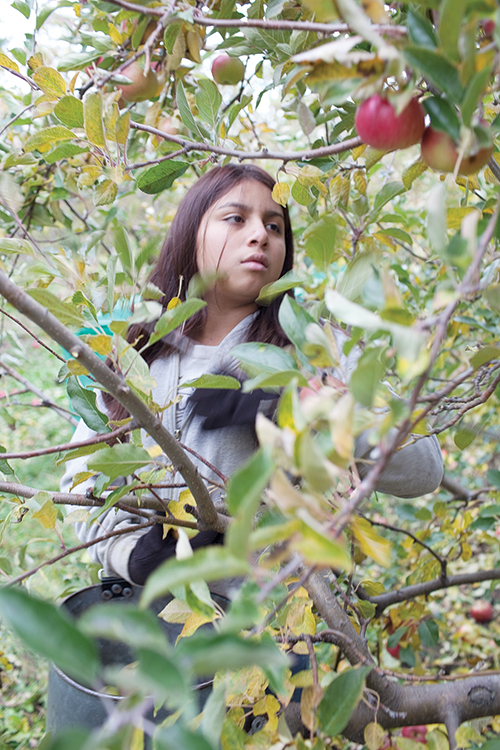
Fruits and vegetables—a staple commodity in American kitchens. Everyone eats them, but does anyone know how they get from field or orchard to our plates at home?
Farmworker Awareness Week, organized by the Food Action Collective, Las Mujeres de la Raza and the Sustainability Leadership Center, kicks off next Monday with “Dinner, Documentary, and Dialogue,” which seeks to shed light on the questionable conditions of individuals working on farms across the United States.
Portland State professor Dr. Jack Corbett, who is participating in the event, detailed the intricacies of a system that goes unnoticed by many Americans.
“Farmworker Awareness Week at Portland State is part of a national, student-driven coalition seeking to draw attention to the dangerous work environment[s] and precarious living conditions of the 2–3 million farmworkers in the U.S.,” said Corbett, who teaches in PSU’s College of Urban and Public Affairs.
“While the popular vision of ‘amber waves of grain’ includes air-conditioned combines mowing their way across the wheat fields of the U.S., more than three-quarters of our fruits and vegetables are still picked by hand,” Corbett said, “a demanding form of labor that is grueling physically due to exposure to heat and rain, dangerous because of exposure to toxic materials such as pesticides, largely lacks protection by labor laws and union organization and suffers from social and cultural isolation in labor camps and small communities across the country.”
In an effort to further highlight some of the less-than-admirable conditions endured by these farmworkers, the film The Harvest/La Cosecha: The Story of the Children Who Feed America will be shown as part of Monday’s event.
The film will be introduced by New York Times best-selling author Tracie McMillan, author of The American Way of Eating: Undercover at Walmart, Applebee’s, Farm Fields and the Dinner Table, and followed by a question-and-answer session with Corbett.
The Harvest/La Cosecha profiles three migrant farmworkers, Zulema, Perla and Victor, as they make dire sacrifices for the survival of their families. The film “profiles these three as they journey from the scorching heat of Texas’ onion fields to the winter snows of the Michigan apple orchards and back south to the humidity of Florida’s tomato fields to follow the harvest,” according to its website.
While these issues do not immediately present themselves as problems facing Portland or the PSU community, Corbett urges us to see these issues as pervasive in the livelihoods of any and all people living in the U.S. today.
“The significance of Farmworker Awareness Week to the Portland State community flows in part from the reality that as an urban institution addressing a predominantly urban population, relatively few of us have had any significant contact with those providing much of the food we consume on a daily basis,” Corbett said. “This unfamiliarity makes it easy to overlook the significant burdens the agricultural labor force bears in keeping [the U.S.] fed at a comparatively low cost.”
In conjunction with an overall lack of knowledge, Corbett argues that because Portland is a politically active, concerned city, these issues resonate with both the residents of the city and the people on campus.
“We celebrate the initiative and creativity that gains Portland a reputation as a center for sustainability through neighborhood gardens, farmers markets, food carts and other manifestations of community engagement with food as a pathway to health, well-being, and opportunity,” Corbett said. “To the extent that many members of the PSU community have strong commitment to values of social justice and equity, farmworkers represent a major group suffering continued marginality.”
Dinner, Documentary, and Dialogue
Part of National Farmworker Awareness Week
Monday, April 15, 5 p.m.
Native American Student and Community Center
More information available at pdx.edu/insidepsu/news/farmworker-awareness-week-who-grows-your-food
Free and open to the public (with free food)
With Farmworker Awareness Week, the PSU community looks to emphasize initiatives that surround food culture and social justice issues.
“The university takes great pride in hosting a [farmers] market nurturing healthy consumption and sustainability,” Corbett said. “We should have equal concern for the people whose contributions to our food supply may come at the cost of health risks from toxics, few opportunities to improve their living standards or vulnerability to the predatory inclinations of some in the dominant society. As the university moves toward the creation of a food systems minor, we need to be mindful of the social dimensions of a food systems focus.”
Farmworker Awareness Week kicks off on Monday and will feature events throughout the week that are centered on sustainability and where exactly our food comes from.

